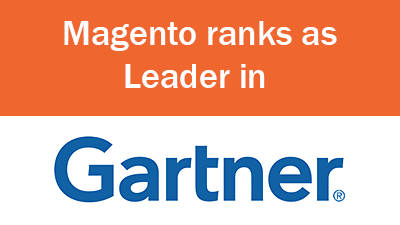Gartner have recently posted an article titled Magic Quadrant for Digital Commerce comparing various eCommerce solutions, here we will take a look at how Magento rates.
Gartners definition / description of a digital commerce platform:
“buying and selling of goods and services using digitalization technologies that result in a transaction of value to the customer. Selling may encompass the internet, mobile networks, social networks, the Internet of Things (IoT) and so on.”
The basic functionality of an eCommerce platform includes:
Shopping Cart and checkout
Search capability
SEO implementation via tagging and mapping
Digital commerce platforms encompass business to consumer (B2C), or business to business (B2B) transactions.
“in some cases, these platforms support distribution networks enabling a connection between sellers, distributors and end customers (B2B2C). In other cases, they support continual buying through automation with such features as automated replenishment or subscription services.”
In their Magic Quadrant for Digital Commerce Gartner placed Magento within the Leader category.
The entry is as follows:
Magento
Magento is a Leader based on evaluation of its Magento Commerce platform (formerly known as Magento Enterprise Edition). Magento Commerce goes to market with a single-tenant SaaS, AWS cloud-hosted managed service offering, but can be deployed on-premises or on alternative public or private clouds. Other offerings commonly sold with Magento Commerce, including Magento OM and Magento Business Intelligence (BI), are multitenant SaaS solutions. The vendor also offers a free Commerce version, Magento Open Source (formerly known as Magento Community Edition). Magento supports both B2B and B2C customers in a wide range of industries, with GMV typically below $250 million. Magento is owned by two global private equity firms: Permira, based in London, and Hillhouse Group, based in Hong Kong. Magento is headquartered in Campbell, California, U.S.*
Note: After we started this Magic Quadrant research, Magento signed a definitive agreement to be acquired by Adobe; the deal is expected to close during the third quarter of Adobe’s fiscal 2018. Reflection of this acquisition is excluded from this research.
Strengths
Growth and service provider network: Magento has experienced significant growth since becoming an independent company in 2015 (it was formerly owned by eBay), enabling development of a robust service provider network for solution integration and product development.
Complete solution: Magento has several offerings in addition to the base commerce platform, including solutions for OM, data and analytics, social selling, B2B commerce, and CPQ. Its recently released WCM functionality is available today as an extension, to be integrated to the core product in 2018.
Marketplace connectivity: A marketplace module is integrated to Magento Commerce, enabling direct integration to Amazon and with built-in intelligent pricing. The module is available for any Magento customer on request and is scheduled to be generally available in the code base in 2018. Integration to eBay and Walmart/Jet is planned for later in 2018. Prospects that also need a solution for selling in online marketplaces will find the module beneficial.
Cautions
Open-source heritage: Magento has built a strong reputation in the open-source community with its commerce platforms, but is undergoing something of an identity shift, with some newer modules — OM, B2B and BI — not being offered as open source. Prospects drawn to Magento because of its open-source roots should evaluate whether or not they’re comfortable with this shift.
Personalization: Magento lacks native personalization functionality that is often present in the platforms of direct competitors. Instead, it relies on partnerships and integrations for most personalization functionality.
Product information management: Magento Commerce lacks robust PIM functionality, relative to other leading commerce platforms. Gartner client inquiries echo this lack of functionality, which requires clients to seek a solution from a third-party partner at an additional cost.
As you can see the Cautions of Magento are merely restricted to the possibility of a small number of modules not been open source, a different method of personalisation and PIM integration.
Leaders
Leaders demonstrate the ability to:
Provide depth and breadth of commerce functionality
Deliver commerce capabilities across multiple industries and business models
Deliver commerce platforms that can scale up to support large transaction volumes and high levels of digital commerce GMV revenue
Provide sales and support services both directly and through an ecosystem of application, services and integration partners
Deliver additional application functionality that integrates with their core commerce platform
Leaders also have financial, technical and organizational viability, and they appear consistently on client evaluations of digital commerce vendors. They often set the competitive benchmark against which other vendors compare themselves.
The article at Gartner’s provides a clear insight into Magento’s long held position as the leader in eCommerce solutions. Used by medium to large businesses it continues to provide a solid modern platform for your business needs.

